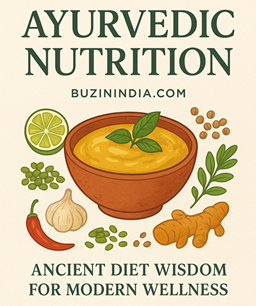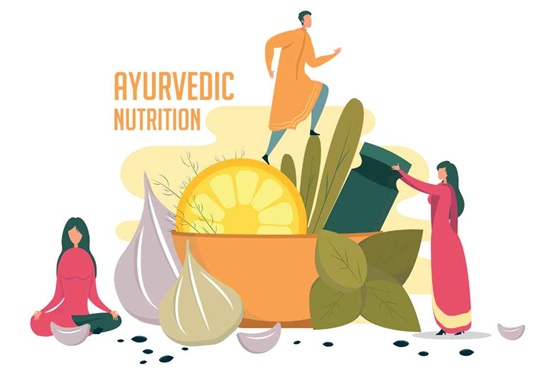Ayurvedic Nutrition: Ayurveda, the 5,000-year-old system of holistic healing from India, believes that food is not just fuel—it’s medicine. Ayurvedic nutrition focuses on eating according to your body constitution (Dosha), the seasons, and natural rhythms to achieve balance, vitality, and long-term health.

Table of Contents
In this guide, we explore how Ayurvedic principles can transform your diet and lifestyle.
🌀 Understanding the Three Doshas in Ayurvedic Nutrition
Ayurveda classifies individuals into three main doshas, or energy types:
- Vata (Air + Space) – Light, quick, and creative. Needs warm, grounding foods like soups, cooked grains, and nuts.
- Pitta (Fire + Water) – Strong, passionate, and focused. Needs cooling, hydrating foods like cucumber, leafy greens, and sweet fruits.
- Kapha (Earth + Water) – Calm, steady, and nurturing. Needs light, spicy, and warming foods like lentils, ginger tea, and leafy vegetables.
📌 Tip: Most people are a combination of doshas, so it’s essential to understand your unique balance.
🍽️ Core Principles of Ayurvedic Nutrition
- Eat Fresh and Seasonal: Freshly prepared meals are packed with prana (life force). Avoid processed, stale, or reheated foods.
- Balance the Six Tastes: Ayurveda recommends including sweet, sour, salty, bitter, pungent, and astringent tastes in each meal for complete nourishment.
- Mindful Eating: Eat in a calm environment without distractions. Chew slowly to aid digestion.
- Spices as Medicine: Turmeric, ginger, cumin, fennel, and coriander not only enhance flavor but also support digestion and immunity.

🥗 Ayurvedic Superfoods
- Ghee (Clarified Butter) – Nourishes tissues, boosts immunity, and supports digestion.
- Mung Beans – Easy to digest and rich in protein.
- Tulsi (Holy Basil) – Strengthens the respiratory system and reduces stress.
- Triphala – A herbal blend for detox and digestive health.
⏰ Ayurvedic Eating Timetable
- Breakfast (Light) – Warm porridge, herbal tea, or fresh fruits based on your dosha.
- Lunch (Heaviest Meal) – Eat around noon when digestion is strongest. Include whole grains, vegetables, and protein.
- Dinner (Light & Early) – Soups or steamed veggies, eaten 2–3 hours before bedtime.

🌱 Seasonal Eating in Ayurveda
- Summer – Cooling foods: cucumber, melons, mint.
- Winter – Warming foods: root vegetables, stews, spices.
- Monsoon – Light, digestive-friendly foods: khichdi, herbal teas.
💡 Benefits of Ayurvedic Nutrition
- Boosts digestion and metabolism
- Balances hormones naturally
- Strengthens immunity
- Reduces inflammation
- Promotes mental clarity and emotional stability

7 Anti-Inflammatory Foods -Natural Path to Better Health
✅ Final Thought
Ayurvedic nutrition is not about strict dieting—it’s about harmony. By listening to your body, eating mindfully, and choosing foods that balance your dosha, you can enjoy better health, more energy, and a peaceful mind.

1 thought on “🌿Ayurvedic Nutrition: Ancient Wisdom for Modern Wellness”